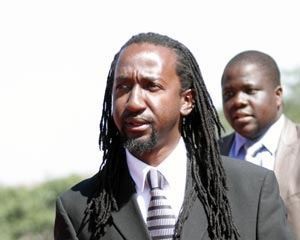The arrogance and complete egotism of shown Zhuwao while addressing delegates to this meeting where he maintained that the government was bent on implementing the indigenization as it is because Zanu PF was elected in the 2013 elections through its ‘promise indigenization and empowerment, shows how Zhuwao has lost his marbles.
It appears that Zhuwao, a losing Zanu PF primary elections candidate, is unaware of the wide spread electoral chicanery and open rigging which put his uncle’s party in government. The people of Zimbabwe never openly endorsed the criminal Zanu PF rule hence their lack of confidence in the system characterized by over US$2 billion capital flight within days of proclaiming a Zanu PF victory after July 31, 2013.
The People’s Democratic Party (PDP) restates its position that the proposed Zanu PF model of indigenization policy does not work in a country where 75 percent of the population is surviving on less than $1 a day. It is a haven for patronage, primitive accumulation and the last feeding trough for corrupt elites in a dying economy.
Zanu PF’s proposed indigenization policy will resulted in billions of dollars in capital being siphoned out of the country to foreign investors if they are to be compensated for their shares based on stock market values. If the government is to be adamant and maintain that they will undertake compulsory acquisition of shares, then investors will simply withdraw their money from the financial sector and close shop and go elsewhere.
Zimbabwe must be a strategic player in global investment as it has vast mineral resources, an excellent climate, large tracks of arable land and a hard working and educated work force. This comparative advantage must be utilized by implementing policies that promote economic growth in a stable and sustainable manner.
In this regards, media reports attributed to the British Embassy in Harare by the Sunday Mail over the weekend on Zanu PF’s indigenization policy are unfortunate. While the PDP recognizes the right of the international community to engage with the government of the day, even if it is rogue, this engagement must be on principles of the internationally recognized and codified democratic ethos and values.
Whilst reports from the Sunday Mail should not be accepted at face value, we should make it very clear to the international community that it is tragic for the suffering people of Zimbabwe for the international community to accept Zanu PF’s insanity in regards to its indigenization policy.
We notice with regret the post-2013 elections strategy of the international community of trying to appease Zanu PF and engage the rogue regime and ignore its gross human rights abuses, past and present.
This engagement principle is a sell-out strategy to the principles of democracy, human rights and the rule of law. In recent weeks, the Zanu PF has upped its game and is harassing, beating and arresting innocent citizens who will be exercising their constitutional rights by engaging in peaceful demonstrations.
That this policy of ensuring that every country has a duty in upholding the rule of law and respecting its Constitution appears to have been abandoned in Zimbabwe by the international community. What is wrong is wrong and foreign countries must be seen as serving and being on the side of the poor not and not siding with a rogue state.
Still on this point, we note with regret the attempts by some foreign embassies to prop-up some faction leaders in Zanu PF and ignoring the plight of the suffering Zimbabweans who have been abandoned by their governments, which has seen its leaders focusing on their survival than serving the citizens.
What Zimbabwe is in need of at the moment are not strong and faction-ridden leaders but leaders who are there to serve the interests of the majority and who are elected by a free, fair and credible electoral process. Zimbabwe does not need electoral rejects who have mastered the Stalinist tactics of mass electoral theft.
Post published in: Business



“Zanu PF’s proposed indigenization policy will resulted in billions of dollars in capital being siphoned out of the country to foreign investors if they are to be compensated for their shares based on stock market values. If the government is to be adamant and maintain that they will undertake compulsory acquisition of shares, then investors will simply withdraw their money from the financial sector and close shop and go elsewhere.”
This thinking is ass backwards. What the people of Zimbabwe must do, is BUILD for themself if foreigners withdraw. We are not here to be taken advantage of by foreigners. If anything, foreigners should be begging us. We don’t need them. We need to be in charge of our own country.